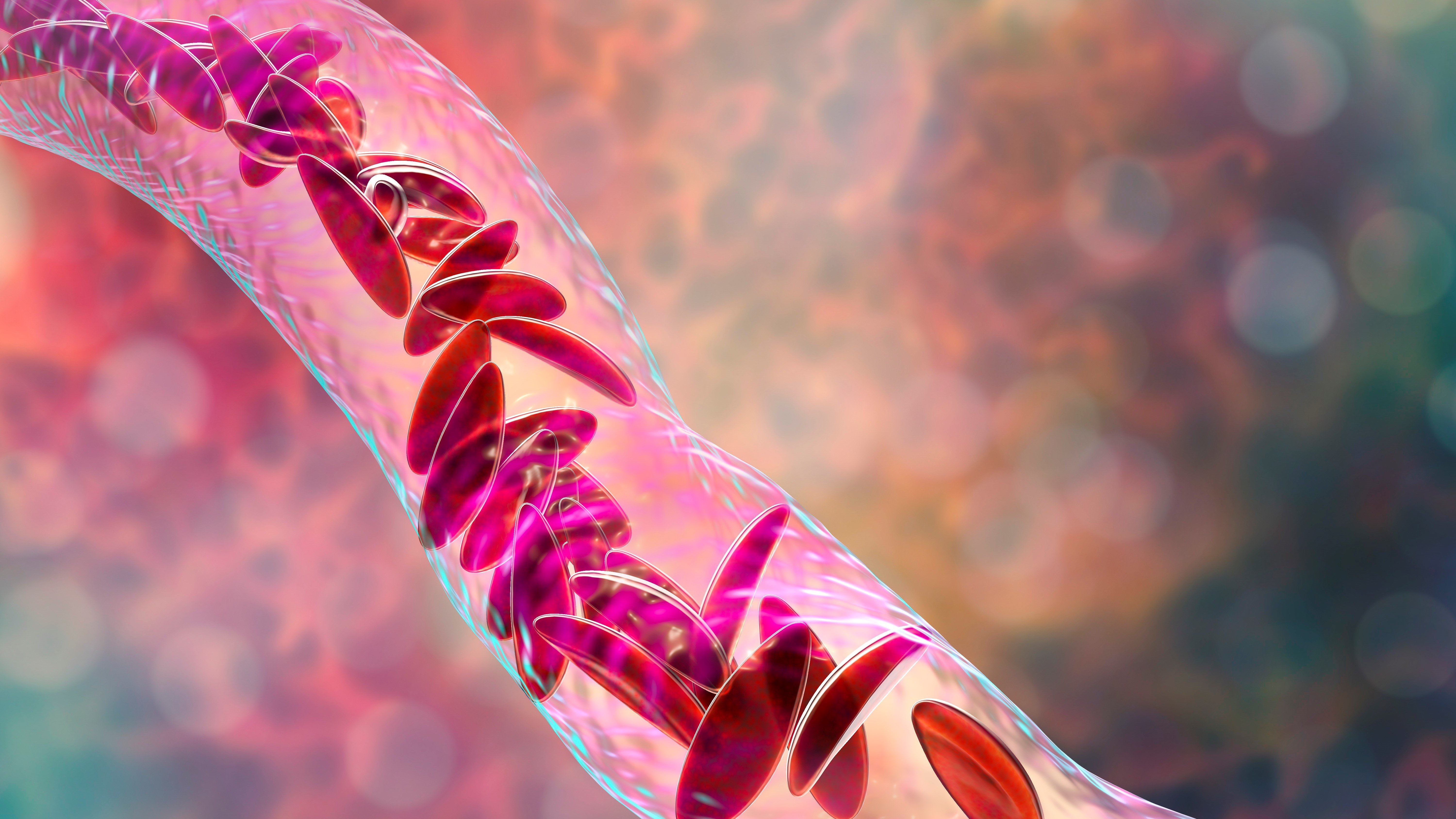预约演示
更新于:2025-05-07
Red blood cell disorder
红细胞疾病
更新于:2025-05-07
基本信息
别名 C-10 RED BLOOD CELL DISORDERS: GENERAL TERMS、RED BLOOD CELL DISORDERS、RED BLOOD CELL DISORDERS: GENERAL TERMS + [14] |
简介- |
关联
1
项与 红细胞疾病 相关的药物靶点- |
作用机制- |
在研机构- |
在研适应症- |
非在研适应症 |
最高研发阶段无进展 |
首次获批国家/地区- |
首次获批日期1800-01-20 |
32
项与 红细胞疾病 相关的临床试验CTRI/2025/03/081632
Hemoglide- Advanced blood smear and transport technology: A point of care haematology tool - NIL
开始日期2025-03-20 |
申办/合作机构- |
NCT06560164
Restrictive Versus Liberal Thresholds for Red Blood Cell Transfusion in ExtraCorporeal Membrane Oxygenation - the TREC Study
Rationale: In patients supported with extracorporeal membrane oxygenation (ECMO), transfusion of red blood cells (RBC) is very common. This is possibly due to the application of liberal thresholds and the lack of evidence-based guidelines. Although RBC transfusion can be lifesaving, it is also a risk-bearing intervention with substantial risk for morbidity and mortality in this critically ill population. Also, with increasing scarcity, RBC transfusions are becoming more expensive. Furthermore, in the past decades it has been shown in several critically ill patient populations - not on ECMO - that maintaining a restrictive hemoglobin (Hb) threshold for RBC transfusion is non-inferior, including in cardiothoracic surgery, acute myocardial infarction and septic shock. Therefore, the investigators hypothesize that a restrictive transfusion threshold for RBC is safe to apply in patients on ECMO in comparison with a liberal transfusion threshold.
Objective: The primary objective of this trial is to study in a prospective randomized comparison whether a restrictive RBC transfusions strategy is non-inferior compared to a liberal strategy in patients on ECMO with respect to 90-day mortality.
Study design: Prospective multi-center randomized controlled non-inferiority trial.
Study population: Patients, 18 years or older, receiving ECMO.
Intervention: Restrictive RBC transfusion threshold: in case the Hb transfusion trigger of 7.0 g/dL (4.3 mmol/L) is reached, 1 RBC unit at a time will be transfused. The aimed Hb target range of the restrictive/intervention group will be 7.1 - 9.0 g/dL (4.3 - 5.6 mmol/L). Liberal RBC transfusion threshold: in case the Hb transfusion trigger of 9.0 g/dL (5.6 mmol/L) is reached, 1 RBC unit at a time will be transfused. Target range of the liberal group is defined as Hb 9.1 - 11.0 g/dL
Main study parameters/endpoints: The primary outcome parameter is 90-day all-cause mortality.
Secondary outcomes include: 1) proportion of patients on ECMO exposed to allogeneic RBC transfusion; 2) RBC volume infused per patient during ECMO; 3) reasons for RBC transfusion other than Hb triggers; 4) transfusion reactions; 5) time on ECMO; 6) length of hospital- and ICU-stay; 7) in-ICU morbidity; 8) quality of life (QoL), iMTA Medical Consumption Questionnaire (iMCQ) and Productivity Cost Questionnaire (iPCQ) at 3, 6, 9, and 12 months; 9) costs related to a) transfusion, b) hospital admission and c) transfusion-related sequelae.
Objective: The primary objective of this trial is to study in a prospective randomized comparison whether a restrictive RBC transfusions strategy is non-inferior compared to a liberal strategy in patients on ECMO with respect to 90-day mortality.
Study design: Prospective multi-center randomized controlled non-inferiority trial.
Study population: Patients, 18 years or older, receiving ECMO.
Intervention: Restrictive RBC transfusion threshold: in case the Hb transfusion trigger of 7.0 g/dL (4.3 mmol/L) is reached, 1 RBC unit at a time will be transfused. The aimed Hb target range of the restrictive/intervention group will be 7.1 - 9.0 g/dL (4.3 - 5.6 mmol/L). Liberal RBC transfusion threshold: in case the Hb transfusion trigger of 9.0 g/dL (5.6 mmol/L) is reached, 1 RBC unit at a time will be transfused. Target range of the liberal group is defined as Hb 9.1 - 11.0 g/dL
Main study parameters/endpoints: The primary outcome parameter is 90-day all-cause mortality.
Secondary outcomes include: 1) proportion of patients on ECMO exposed to allogeneic RBC transfusion; 2) RBC volume infused per patient during ECMO; 3) reasons for RBC transfusion other than Hb triggers; 4) transfusion reactions; 5) time on ECMO; 6) length of hospital- and ICU-stay; 7) in-ICU morbidity; 8) quality of life (QoL), iMTA Medical Consumption Questionnaire (iMCQ) and Productivity Cost Questionnaire (iPCQ) at 3, 6, 9, and 12 months; 9) costs related to a) transfusion, b) hospital admission and c) transfusion-related sequelae.
开始日期2024-11-26 |
申办/合作机构- |
NCT06872333
Allogeneic Hematopoietic Stem Cell Transplant for Patients With High Risk Hemoglobinopathies and Other Red Cell Transfusion Dependent Disorders
A single center, open label, interventional, phase II trial for donor transplant for high risk hemoglobinopathies and other red cell transfusion dependent disorders utilizing allogeneic hematopoietic stem cell transplantation (HSCT) regimens.
开始日期2024-11-19 |
100 项与 红细胞疾病 相关的临床结果
登录后查看更多信息
100 项与 红细胞疾病 相关的转化医学
登录后查看更多信息
0 项与 红细胞疾病 相关的专利(医药)
登录后查看更多信息
1,106
项与 红细胞疾病 相关的文献(医药)2025-05-01·Pediatric Blood & Cancer
Fava Bean‐ Versus Non‐Fava Bean‐Induced Acute Hemolytic Crisis in Children With Glucose‐6‐Phosphate Dehydrogenase Deficiency: A Prospective Comparative Study
Article
作者: Tandon, Anita ; Prashanth, Gowda Parameshwara ; Al‐Shafey, Mohammed ; Ismail, Salim
2025-04-01·Gene
Whole genome sequencing identifies novel candidate genetic variants in canine stomatocytosis
Article
作者: Davison, L J ; Falcone, S ; Castillo, D ; Williams, T L ; Wallace, M D
2025-04-01·Journal of Cardiovascular Electrophysiology
Hemolysis Biomarkers After Pulmonary Vein Isolation via a Balloon‐In‐Basket PFA Catheter
Article
作者: de Asmundis, Carlo ; Chierchia, Gian‐Battista ; Nakasone, Kazutaka ; Vetta, Giampaolo ; Sorgente, Antonio ; Della Rocca, Domenico G. ; Marcon, Lorenzo
49
项与 红细胞疾病 相关的新闻(医药)2025-02-13
Agios’ blood disease treatment Pyrukynd passed a Phase 3 study in PK deficiency in children who do not regularly receive blood transfusions.
The readout arrives after Pyrukynd last year
failed
to meet the primary endpoint in a separate Phase 3 study of children with PK deficiency who are regularly transfused. Pyruvate kinase deficiency is a rare genetic disease in which red blood cells are prematurely destroyed.
In its
announcement
on Thursday, Agios said that Pyrukynd, also known as mitapivat, hit the primary endpoint of hemoglobin response in the ACTIVATE-Kids study, which enrolled 30 children aged 1 year or older who do not receive regular blood transfusions.
The biotech said that six of 19 patients who received Pyrukynd saw a sustained increase (≥1.5 g/dL) in their hemoglobin levels by 20 weeks. Meanwhile, none of the 11 patients in the placebo arm reached the bar of hemoglobin response.
Safety-wise, there was a similar proportion of patients who had adverse events in both study arms, and there were no discontinuations in the study, according to Agios. Back in December, the biotech
disclosed
that five patients in its Phase 3 thalassemia study experienced liver toxicity, two of which were considered serious adverse events.
Notably, Agios now plans to ask for approval of Pyrukynd in children with PK deficiency based on the results of both Phase 3 studies, despite the fact that the previous trial in children who are regularly transfused missed its key endpoint.
Pyrukynd is currently approved in the US to treat hemolytic anemia in adults with PK deficiency. Agios is also studying the therapy in other conditions like thalassemia and sickle cell disease.
In its
earnings update
on Thursday, Agios said it has submitted Pyrukynd for approval in adults with thalassemia in the US, where the FDA has a decision deadline of Sept. 7. It’s seeking approval regardless of transfusion status and for both alpha- and beta-thalassemia patients. The biotech has also asked for approval for the same indication in the EU, Saudi Arabia and UAE.
Pyrukynd is what’s known as a pyruvate kinase activator. Pyruvate kinase is a key enzyme in red blood cells that converts sugar into energy. The belief is that increasing its activity will keep red blood cells from breaking down prematurely.
Novo Nordisk is developing a competing treatment called etavopivat, which it acquired as part of its $1.1 billion purchase of Forma Therapeutics in 2022. It’s studying etavopivat in sickle cell disease and thalassemia, and it announced in December that etavopivat is
heading to pivotal trials
in sickle cell disease.
临床3期临床结果并购上市批准
2025-01-22
IMMvention Therapeutix claims the druglike properties of its candidate set the molecule apart from other BACH1 inhibitors.\n Novo Nordisk is opening a new front in its fight against sickle cell disease, inking a deal with IMMvention Therapeutix to co-develop oral treatments for the red blood cell disorder and other chronic conditions.The Danish drugmaker established itself as a player in sickle cell in 2022 when it paid $1.1 billion to buy Forma Therapeutics. Since then, Forma’s oral selective pyruvate kinase-R activator etavopivat has moved deeper into the clinic, with phase 3 data in one trial scheduled for 2026 and another late-stage study just getting underway. At the same time, Pfizer’s withdrawal of Oxbryta has created opportunities.Novo has identified IMMvention as a partner that can strengthen its presence in the field. IMMvention is moving BACH1 inhibitors through preclinical development. The oral small molecules could induce fetal hemoglobin expression.Other companies have hit on the idea of treating sickle cell by inhibiting BACH1. Mitobridge, which Astellas acquired for $225 million upfront in 2017, discovered the BACH1 inhibitor ML-0207, also known as ASP8731. Astellas started a phase 1 trial of the candidate in 2022 but terminated the study well short of its enrollment target after “protocol defined stopping criteria” were met. vTv Therapeutics has also worked on BACH1 inhibitors. The biotech licensed a candidate to Anteris Bio for use in renal diseases in 2020 but retained the rights in other indications. Last year, a vTv scientist co-authored a paper about using a BACH1 inhibitor to induce fetal hemoglobin expression.IMMvention claims the druglike properties of its candidate set the molecule apart from other BACH1 inhibitors. The press release about the Novo deal lacks a timeline for when the partners could generate clinical data to back up the claims, but IMMvention’s website lists its targets. The biotech’s road map includes IND-enabling studies and phase 1 trials in 2026 and 2027.Novo will now take responsibility for the studies. The drugmaker will take over all further development upon or prior to nomination of a development candidate. Novo has a global license to IMMvention’s systemic BACH1 inhibitors. The biotech has retained the rights to brain-penetrant BACH1 inhibitors that could have applications in conditions including Parkinson’s and Alzheimer’s diseases.

并购临床1期临床3期引进/卖出蛋白降解靶向嵌合体
2025-01-16
·医脉通
阵发性睡眠性血红蛋白尿症(PNH)是一种慢性血液系统疾病,临床表现复杂多样,累及全身多个系统,常见症状包括血红蛋白尿、疲乏和呼吸困难等,严重影响PNH患者日常工作与生活1。溶血是导致PNH患者系列症状的根本原因2,尽管末端补体抑制剂在临床治疗中取得了一定成果,但是由于溶血残留问题,患者无法回归正常生活3,亟需进一步优化治疗方案。本期内容特邀南方医科大学珠江医院李玉华教授、梁钊教授深入剖析PNH溶血残留问题,并结合最新研究数据探讨伊普可泮在改善PNH症状方面的优势,以帮助临床更好地理解和管理这一复杂疾病。
伊普可泮解决PNH治疗中的残留溶血问题
研究发现,补体旁路途径自发水解介导补体持续激活,扩增环介导补体信号迅速成倍放大。因此,补体旁路途径贡献了80%以上的下游活化产物4,是PNH的核心致病机制。基于此,开发补体旁路途径抑制剂成为克服PNH治疗局限,提高PNH治疗效果的重要方向。伊普可泮靶向补体B因子,选择性抑制补体旁路途径,阻断扩增环介导的补体放大,全面强效控制末端C5介导的血管内溶血和近端C3介导的血管外溶血,有效解决PNH治疗中的残留溶血问题(图1)。
图1 伊普可泮阻断扩增环放大补体信号
APPOINT-PNH研究进一步证实了伊普可泮可有效解决PNH治疗中的残留溶血问题。研究结果显示5,6,在未接受过补体抑制剂治疗的PNH患者中,伊普可泮治疗24周时,在未输注红细胞的情况下,92%的患者血红蛋白水平较基线增加≥2g/dL,63%的患者血红蛋白水平≥12g/dL,48周时,患者比例分别提升至97.4%和79.5%。在24周核心治疗期间,98%的患者摆脱输血,95%的患者乳酸脱氢酶(LDH)水平≤1.5倍正常值上限。
伊普可泮大幅改善PNH相关症状/体征
伊普可泮能够有效解决PNH治疗中的残留溶血问题,从而大幅改善PNH相关症状与体征。在APPOINT‑PNH研究中7,纳入40例未接受过补体抑制剂治疗且平均血红蛋白水平<10g/dL的成人PNH患者,接受为期48周的伊普可泮单药治疗(200mg),包括24周的治疗期和24周的扩展期。今年美国血液学会(ASH)年会上公布了患者报告的健康相关生活质量(HRQoL)和研究者评估的PNH相关症状/体征:
患者PNH症状大幅改善:基线时,有97.5%的患者存在≥1个PNH症状/体征(最常见症状:血红蛋白尿),到第48周时,这一比例降至27.5%(图2)。
图2 基线、第24周和第48周时≥1个PNH症状/体征的患者比例
患者血红蛋白尿症状大幅改善:基线时,仅22.5%的患者未出现血红蛋白尿,到第48周时这一比例增加至95.0%(图3)。
图3 基线、第24周和第48周时出现血红蛋白尿的患者比例
患者虚弱/疲劳症状大幅改善:基线时,仅30%的患者未出现虚弱/疲劳,到第48周时这一比例增加至77.5%(图4)。
图4 基线、第24周和第48周时出现虚弱/疲劳的患者比例
患者呼吸困难症状大幅改善:基线时,仅70%的患者未出现呼吸困难,到第48周时这一比例增加至97.5%(图5)。
图5 基线、第24周和第48周时出现呼吸困难的患者比例
伊普可泮帮助PNH患者回归正常生活
伊普可泮大幅改善了PNH相关症状与体征,使患者报告的欧洲癌症研究和治疗组织生活质量问卷(EORTC QLQ-C30)中的总体健康状况、所有功能领域和症状评分均有所改善,多维度改善PNH患者的生活质量和症状,助力患者回归正常生活。
第48周时,患者报告的总体健康状况以及所有功能领域(包括认知、情绪、躯体、角色、社会功能)均有改善(图6)。
图6 患者EORTC QLQ-C30功能领域评分在第24周和第48周时较基线的平均变化
第48周时,患者报告的食欲下降、便秘、腹泻、呼吸困难、疲劳、失眠、恶心呕吐和疼痛症状均有改善(图7)。
图7 患者EORTC QLQ-C30症状评分在第24周和第48周时较基线的平均变化
总结
PNH相关症状/体征严重影响患者的日常工作和生活,而末端补体抑制剂治疗下的溶血残留是导致患者无法回归正常生活的主要原因。伊普可泮能够阻断PNH的核心发病机制,选择性抑制补体旁路途径,全面强效控制血管内外溶血,有效解决残留溶血问题,使患者回归正常生活。现有临床研究表明,伊普可泮可实现血红蛋白正常化,摆脱输血依赖,大幅改善PNH相关症状/体征,长期多维度改善患者的生活质量,帮助PNH患者回归正常生活。
专家简介
李玉华
南方医科大学珠江医院
主任医师、教授、博士生导师、留美博士后
南方医科大学珠江医院血液科主任
中国研究型医院学会血液病精准诊疗专业委员会副主任委员
中国抗癌协会血液肿瘤专业委员会常委
中国医师协会血液科医师分会委员
广东省医师协会血液科医师分会主任委员
《临床血液学》 编委会编委
《血栓与止血学》编审委员会常委
主要研究方向为白血病耐药机制及肿瘤生物治疗。承担国家级、省市级等科研项目20余项;授权国家发明专利10项,美国发明专利1项;在国内外期刊发表论文100余篇,其中Nature Nanotechnology、Nature Biomedical Engineering、Proc Natl Acad Sci US等重要SCI杂志收录60余篇;先后获军队科技进步二等奖,广东省科技进步三等奖,广东医学科技二等奖,中国女医师五洲女子科技奖等
梁钊
南方医科大学珠江医院
主治医师、医学博士
广东省健促会干细胞及免疫细胞治疗分会常委兼秘书
广东省医师协会血液科医师分会秘书
广东省基层医药学会血液病学分会委员
广东省医疗安全协会血液病学分会委员
广州市医学会血液肿瘤分会委员
2017年开始从事CAR-T细胞治疗,对CAR-T细胞全流程管理有丰富经验。参与国家级及省级课题多项,第一作者发表SCI论文多篇,参编《血液系统恶性疾病免疫治疗学》
「参考文献」
1.中华医学会血液学分会红细胞疾病(贫血)学组. 中华血液学杂志,2024,45(8):727-737.
2.Rother RP, et al. Nat Biotechnol. 2007 Nov;25(11):1256-64.
3.Waheed A, Shammo J, Dingli D. Blood Rev. 2024 Mar;64:101158.
4.Harboe M, et al. Clin Exp Immunol. 2004 Dec;138(3):439-46.
5.Peffault de Latour R, et al. N Engl J Med. 2024 Mar 14;390(11)994-1008.
6.Antonio M Risitano, et al. 2024 EBMT Abstract: A133.
7.Antonio M Risitano, et al. 2024 ASH. abstract 4079.
审批码FAB0038342-85932,有效期为2025-01-15至2026-01-14,资料过期,视同作废
END
医脉通是专业的在线医生平台,“感知世界医学脉搏,助力中国临床决策”是平台的使命。医脉通旗下拥有「临床指南」「用药参考」「医学文献王」「医知源」「e研通」「e脉播」等系列产品,全面满足医学工作者临床决策、获取新知及提升科研效率等方面的需求。
临床结果
分析
对领域进行一次全面的分析。
登录
或

生物医药百科问答
全新生物医药AI Agent 覆盖科研全链路,让突破性发现快人一步
立即开始免费试用!
智慧芽新药情报库是智慧芽专为生命科学人士构建的基于AI的创新药情报平台,助您全方位提升您的研发与决策效率。
立即开始数据试用!
智慧芽新药库数据也通过智慧芽数据服务平台,以API或者数据包形式对外开放,助您更加充分利用智慧芽新药情报信息。
生物序列数据库
生物药研发创新
免费使用
化学结构数据库
小分子化药研发创新
免费使用
